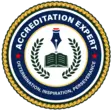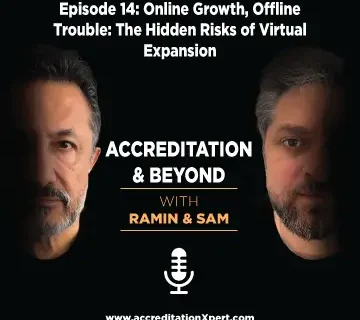
Starting a school, college, or online academy in the U.S. can feel overwhelming, especially for first-time founders. From legal approvals to financial planning, many aspiring school owners are unsure where to begin. In Episode 10 of our podcast Accreditation and Beyond, Dr. Ramin Golbaghi and Sam walk through the 10 most frequently asked questions new founders ask when planning to launch a school.
How do I start a school or college in the US?
Starting a school is like launching a business and a regulated educational institution. You must:
- Form a legal entity
- Design an academic program
- Prepare a student catalog
- Hire qualified faculty
- Apply for state approval
Only then can you enroll students. Accreditation comes after these steps.
Do I need state approval before enrolling students?
Yes. Enrolling students or collecting tuition without approval can result in fines, legal action, or permanent ineligibility. This applies whether your school is in-person or online.
What’s the difference between licensing and accreditation?
- Licensing: Legal approval by a state to operate. Focused on minimum standards and student protection.
- Accreditation: Voluntary process to prove quality, outcomes, and long-term credibility.
You must be licensed before applying for accreditation.
Can I start an online school?
Yes, but there are extra compliance layers:
- Build courses specifically for online delivery
- Implement a Learning Management System (LMS)
- Track attendance and assessments securely
- Ensure accessibility for students with disabilities
Some states also require registration in other states if you serve students across borders.
How much money do I need to launch?
- Certificate-based schools: $50,000 to $100,000
- Degree-granting institutions: Several hundred thousand dollars
You’ll also need to document your financials with state agencies and accreditors.
What type of school should I open?
Depends on your audience and goals:
- Certificate/vocational programs: Faster to launch and lower cost
- Degree programs: Higher prestige, but more regulations and staffing needs
Some schools start small and scale up.
Can non-US citizens open a school?
Yes—but you need to:
- Register a U.S.-based legal entity
- Appoint a local agent
- Provide financial and compliance documentation
Some processes (like tax IDs or background checks) may be more complex.
Do I need a physical location?
- Online schools: Some states don’t require a campus, but many need at least an admin office
- Hands-on programs (e.g., medical labs, dental assisting): A physical space is required
Always check your state’s specific rules.
How long does it take to get approved?
Typically 3–6 months for state approval + time for setup. Total time to launch: 6–12 months. Well-prepared schools can launch faster.
What’s the first step I should take?
Have a conversation with an expert.
Avoid wasting time with guesswork. Start with a strategy session to:
- Clarify your program, audience, and approval path
- Identify your readiness level
- Avoid costly mistakes
Need help launching your school?
Visit Accreditation Xpert to book a free strategy call and access licensing, accreditation, and startup resources.
Like this episode?
Subscribe to Accreditation and Beyond, leave a review, and share it with fellow founders.
Written by the Accreditation Expert Consulting Team





